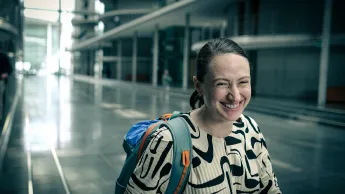How a fellowship in Berlin shaped Heidi Obermeyer’s career
- 2024-10-08
- Lisa Priller-Gebhardt
- Comment

Our series gives international Germany alumni the opportunity to report on the impact of their funding and stay in Germany on their personal development and professional career. Next up in our series is Heidi Obermeyer. A research stay in Berlin enabled this political scientist to make a bold career move in her native USA that wouldn’t have been possible without her fellowship.
This fellowship was a gift for me. It enabled me to make an incredibly bold career move.
‘My love of Germany and my interest in German culture are probably rooted in the fact that my grandfather emigrated from Germany to America after the Second World War. He came from Oberstaufen in Bavaria and settled in Colorado’, recounts Heidi Obermeyer, whose great-grandmother was a Jewess. Her grandfather Klaus founded a sports equipment company there. He is also responsible for her name Heidi, which is unusual for America. Two of her brothers are incidentally named Karl and Fritz.
University life: differences between Germany and America
Heidi spent a year in Munich during her political studies and later a further semester in Berlin. ‘It was a challenging time, because, even though I could speak reasonably good German, I had to learn a lot of new vocabulary. It was particularly with the Bavarian dialect that I initially had major issues’, she recalls. ‘The even sounds like a foreign language to many Germans.’
She also feels that is significantly different to that in the USA, where students are closely supervised and usually live on campus. ‘As a student in Germany, you’re left a lot more to your own devices’, says Heidi Obermeyer. She also felt that and making new friends was difficult. Nowadays she uses walnuts and peaches to compare Germans and US Americans: ‘In the case of Germans, it’s difficult to bite through to the kernel, but once you’ve done it you've got a friend for life. Americans on the other hand are more easily accessible, but more difficult to truly get to know well.’
German Chancellor Fellowship: travel, research and new discoveries
She applied for the in Berlin in 2017, three years after she completed her studies and was working. This global exchange programme operated by the is aimed at young managers from Brazil, China, India, South Africa and the USA. The international participants conduct independent research activities in Germany into self-selected topics. ‘My project dealt with geopolitical developments and their impacts on the German middle class’, Heidi Obermeyer explains.
The programme was very varied for Heidi. It included the participants undertaking a three-week journey that also took her to Bonn, the former seat of government, and to the DHL headquarters – the so-called Post Tower. A further trip around Germany took her through medium-sized cities like Jena, Bayreuth, Karlsruhe and Stuttgart. ‘This programme was the turning point in my career’, says the US American. It became clear to her during this time that she didn’t want to work in the defence sector, but that her future career lay in the private sector. ‘This fellowship was a gift for me. It enabled me to make an incredibly bold career move without which I wouldn’t be where I am today’, stresses Heidi Obermeyer. She now works in Seattle for a consultancy that specialises in macro and geopolitical risks. Her priority involves the impacts of international trends on the technology sector. The most significant aspects that I’ve recently investigated include the global semiconductor industry, the US elections in 2024 and data regulation, including data localisation, data protection and AI’, the expert explains.
